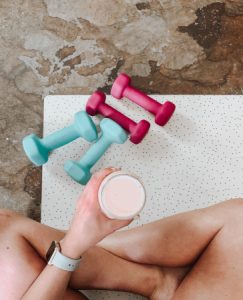Hannah Diaz is a professional soccer player, currently with the Houston Dash. Hannah’s expertise expands to sports nutrition, general fitness, and running. She has coached soccer and conditioning sessions for athletes at many levels. She is a regular contributing writer for Complete Tri.
Protein, what’s the big deal?
The most important aspect of any athlete’s life is health. We can’t do what we love if we have been sidelined by injury or forced to take days off due to fatigue. Oftentimes we are so focused on training that we neglect the tools at our disposal, which can make training easier, more efficient, and much more valuable. We’re talking about protein, and while there are differing opinions on methodology, there are ways for an athlete to be sure they have covered all the bases.
What is Protein? And Why is It Important?

Protein is vital for enhancing post exercise recovery. It provides the body with necessary equipment for rebuilding and repairing muscle tissue after a fasted state (i.e. exercise). Meeting the demands of your body will optimize muscle growth, quality, and performance of any athlete, but it can be difficult to pinpoint what those demands are, as they change from workout to workout and from athlete to athlete.
Prolonged exercise, especially high intensity work, depletes our stored energy and the body begins to dip into protein for fuel. So, if our body doesn’t have enough fuel to begin with (carbs and certain fats), it will eat up that protein storage, leaving your muscles tired and incapable of maintaining a high level. The timing of introducing protein, among other nutrients, and maintaining the proper protein intake, can work to offset this and promote development instead of injury and fatigue.
So, How Much Protein Do You Need After a Workout?
A general rule for athletes is to make sure they are consuming somewhere between 1.4 to 2.0 grams of protein per kilogram of body weight, everyday. This means an athlete of 60kg (132 lbs) should be looking to get between 84-120 grams of protein everyday.
Note that this is higher than the amount recommended for people who are not as active, which is more in the 7 grams per pound of bodyweight range (so that 132 pound person would be shooting for 48-50 grams.)
The more protein that is consistently in your diet, the better adapted your body is to absorb protein efficiently when it is introduced. With that being said, the ideal amount of consumption in one sitting is 20-30 grams, this includes post workout, anything else may be considered excess. Therefore, the best way to maintain performance is to practice consistency and keep track of daily protein consumption as well as increased intake around exercise.
It is important to note that the requirement of protein intake in order to maximize recovery can and often does change depending on the type of exercise. Endurance workouts — like a multi-hour bike ride — could require up to 60% greater intake than resistance training. The best thing an athlete can do is make sure they are meeting the minimum daily recommendation and continue to be conscious of how the body is feeling during and after a workout. If you’re low energy, perhaps you need more carbohydrates and electrolytes. If you are waking up the day after a workout out feeling weak and depleted, maybe you didn’t provide your body with enough protein. But, in most cases a combination of the two is the best method.
When Is Protein The Most Important?

We have all heard of the infamous recovery window, the magic period of one to two hours after a workout in which we need to refuel our muscles. Consuming rapidly digested protein is the most effective way to kickstart the recovery process—but the body continues to remodel and replenish for at least 24 hours after exercise.
It is crucial to aid this process all the way through, and in ideal cases, get ahead of it. Sandwiching your workout with protein ingestion is a great way to make sure your muscles are covered. An ideal application might be 20-25 grams of protein one hour before exercise, then another 20 grams within the first hour post workout. This, accompanied with a meal 3-4 hours later, can insure your body is getting both fast and slow absorbing proteins throughout the recovery process. In fact, making sure you are getting a well balanced meal every 3-4 hours during the day is an easy way to stay fueled.
Not that this doesn’t only go for strength training. You should give your body protein during the recovery window after everything from endurance rides to indoor training sessions to core workouts.
Where Can You Find Protein?
When it is possible, an athlete should always try to achieve their protein goals through whole foods alone. But sometimes meals are inconvenient and supplementation is often a great option for athletes looking to boost their protein intake. Supplements are not limited to protein powder and bars, another great option is an amino acids supplement, referred to as BCAAs, which can be found in powders and used before, during, or after a workout. Most protein powder options now include BCAAs in their mixture. But to make sure your body is absorbing and breaking down protein efficiently, it is important not to rely on only supplementation and make sure you’re using natural whole foods to the best of their ability. The amount of protein powder you get in a day should not be your only protein intake – not even close.

Some examples of protein sources you may not normally reach for:
- Greek yogurt
- Cottage cheese
- Bone broth
- Chickpeas
- Lentils
- Pumpkin/hemp seeds
But remember: protein isn’t everything. Your body needs a variety of nutrients to perform at a high level, and it is never good to focus only on protein while ignoring other important aspects of diet like carbohydrates and fats. Consuming carbs along with protein gives your body the best chance at recovering properly, especially if you have multiple workouts in a shorter period of time. An easy formula to make sure you’re on the right track is: 3 to 1 carbs to protein. So, if you’re getting in 30 grams of protein post workout, you should be pairing that with 90 grams of carbohydrates.
Considerations for Protein for Women Athletes

Body requirements for females can change during different stages of their menstrual cycle and it is important for the athlete to at least be aware of this possibility. For example in the follicular phase post-exercise requirements may decrease, but adequate energy intake will increase. This is even more so for endurance athletes. A good way for females to monitor their changes in body requirement is as simple as keeping a daily workout journal to record levels of fatigue before, during and after workouts. Comparing these levels to the stages of your cycle will expose the certain days or weeks you may need to alter your approach.
All in all, try not to overlook daily protein intake by focusing too much on getting protein in right after a workout. In a perfect world you would have the right amount everyday, but don’t feel like you are at loss if you forget your protein shake after a run. Just make sure you’re meeting your daily needs, checking in with your body, and staying proactive. Consistency is key.
How Protein Can Your Body Absorb at Once?
While it is critical that you get some good quality protein after a workout, and a good dose of it, it is actually possible to have too much. Too much protein won’t hurt you, but at a certain point, your body stop absorbing it. The exact amount that your body can intake is a bit up for debate, but generally speaking, having 30-40 milligrams in one sitting is probably that a person can process, depending on their size and metabolism. Beyond that, it is probably best to wait for your body to absorb it, and give it another shot of protein 2+ hours later if you feel more is warranted.
How Much Protein Do I Need Each Day?
The rule of thumb, and one we get from Dr. Attia, of Attia Medical, is that you should try to get 1/2 of your bodyweight — but in milligrams — on a daily basis. That means taht someone who is 200 pounds should try to get 100 pounds of protein each day. Someone who is 140 pounds should try to get 70 pounds of protein.
It is hard to get that much protein! You have to be intentional about it.







